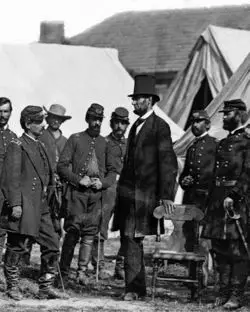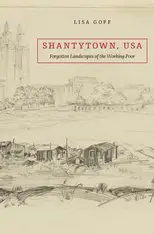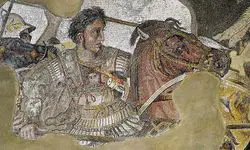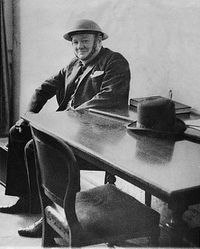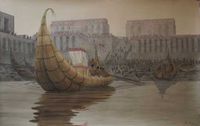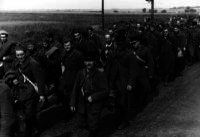Difference between revisions of "Main Page"
| Line 57: | Line 57: | ||
<div class="portal"> | <div class="portal"> | ||
| − | [[File: | + | [[File:French Prisoners 1940.jpg||left|thumb|200px]] |
| − | ====[[Why | + | ====[[Why was France defeated in 1940?]]==== |
| − | + | In September 1939, the Nazi War Machine invaded Poland and World War II began. France and its Britain declared against Nazi Germany in 1939. The French army was in theory as strong as the Germanys and it had a vast Empire and a sophisticated arms industry. It had also established a series of fortifications in the east of the country, known as the Maginot Line. The Line was designed to keep German forces out of France. | |
{{Read more|Why did the United States and Soviet Union Reach Detente During the Cold War?}} | {{Read more|Why did the United States and Soviet Union Reach Detente During the Cold War?}} | ||
</div> | </div> | ||
Revision as of 19:01, 9 June 2016
Engineering Victory during the Civil War: Interview with Thomas F. Army, Jr.
Logistics win wars. Logistics is the coordination of complex operations such as moving, housing and supplying troops and their equipment. War is the ultimate test of any logistician. During the Civil War, the Union troops fought almost the entire war in the South. Thomas F. Army, Jr. argues in his new book Engineering Victory: How Technology Won the Civil War published by Johns Hopkins University Press that the Union's engineering prowess during Civil War gave it an distinct advantage over the Confederacy.Read more...
Why Was the Battle of Antietam a Pivotal event in the American Civil War?
Gettysburg, perhaps the most renowned battle of the American Civil War, was the second incursion of Confederate troops onto Union soil. The first offensive in the North taken by General Robert E. Lee and his Army of Northern Virginia resulted in the Battle of Antietam. On September 17, 1862, Lee’s troops met Union forces, under the command of General George B. McClellan, in Sharpsburg, Maryland.Read more...
Shantytown, USA: Interview with Lisa Goff
The Harvard University Press recently published Lisa Goff's new book Shantytown, USA: Forgotten Landscapes of the Working Poor. There's a chance that one of your American ancestors lived in an American shantytown. While we may not realize it now, shantytowns were a common feature of 19th century America. Goff's book explores not only how shantytowns became a prominent feature of America's towns and cities, but why middle class Americans eventually turned on them and their residents. Read more...
Why Were Homosexuals Persecuted in Nazi Germany?
In Nazi Germany, the ideal Aryan male was stereotyped as being strong, handsome, fanatical about his appearance, and obsessed with youth. The ideal homosexual was stereotyped as being strong, handsome, fanatical about his appearance, and obsessed with youth. The only overt distinction between these two groups of men was their sexual proclivity; which was not exclusive to one group. Read more...
The Nazi triumph: how did Adolf Hitler become the Fuehrer of Germany?
With the death of German President Paul von Hindenburg, Chancellor Adolf Hitler became absolute dictator of Germany under the title Fuehrer or “Leader”. The German army took an oath of allegiance to its new commander-in-chief, and the last remnants of Germany’s democratic government were dismantled to make way for Hitler’s Third Reich. Read more...
Why was Alexander the Great So Successful In His Conquests?
In the public's mind, few well known conquerors in history match the exploits of Alexander the Great. In just a few years, from 334-330 BC, Alexander would go on to conquer the largest empire the world had known and establish his own empire that eventually stretched from Greece to India. Read more...
How did Winston Churchill become Prime Minister of the United Kingdom in World War Two?
Winston Churchill led a remarkable life, but perhaps the most remarkable element in his life was how he became prime minister in 1940. Just a few years earlier he was widely seen as politically isolated and was widely ridiculed for his views. Yet in 1940, he was appointed his nation’s Prime Minister at its darkest hours and became the leader of the fight against Nazi Germany. Read more...
What Factors Led to the Creation of the First Cities?
The rise of cities in the ancient Near East during the fourth millennium BC (4000-3000 BC) is a key event in the history of the world, as urban patterns that first arose there became patterns inherited in many societies, including in the West. Cities in the ancient Near East were the first to develop major temples, palaces, large urban dwelling areas, city walls, governments, and religious authorities that become features seen in later cities. Read more...
Why was France defeated in 1940?
In September 1939, the Nazi War Machine invaded Poland and World War II began. France and its Britain declared against Nazi Germany in 1939. The French army was in theory as strong as the Germanys and it had a vast Empire and a sophisticated arms industry. It had also established a series of fortifications in the east of the country, known as the Maginot Line. The Line was designed to keep German forces out of France. Read more...
Articles
Here are some of our most recently created and edited articles.
- Why did the United States start the Mexican American War
- What Caused The Economic Panic Of 1837
- Why did Andrew Jackson want to destroy the Bank of the United States
- Why did the United States begin directly electing Senators in 1913
- How did Mussolini Rise to Power as the Dictator of Italy
- Why did Germany lose the Battle of Stalingrad
- What were Joseph Stalin's goals as World War Two ended
Interviews
These are our interviews with historians discussing their new books.
- Make It Rain: Interview with Kristine C. Harper
- American Girls in Red Russia: Interview with Julia Mickenberg
- Inventing the Pinkertons: Interview with Paul O'Hara
- Primed for Violence in Interwar Poland: Interview with Paul Brykczynski
- American Surveillance: Interview with Anthony Gregory
- Privateering during the War of 1812: Interview with Faye M. Kert
- Nature's Path: Interview with Susan E. Cayleff
Booklists
Includes our most recent Expert and User created Top Ten History Booklists.
Blog Roll
Here are some links to our Favorite History and Academic Publisher Blogs
- Tropics of Meta
- Nursing Clio
- The Junto
- Points: The Blog of the Alcohol and Drugs History Society
- Process: A Blog for American History
- Legal History Blog
- Balkinization
- Cooking in the Archives
- We're History
- Real Clear History
- History News Network
- National Museum of American History
- Oxford University Press Blog
- Johns Hopkins University Press Blog
Contribute
DailyHistory.org is a communitiy history wiki. Almost every page (excluding interviews and expert booklists) can be edited. You are welcome to join us.
- Every article answers a historical question and every booklist is a Top ten list.
- After you register, you will be able to edit and create articles.
- All of your contributions need to be original.
- If you want to create a new page, you can easily do so by using the following form:
Categories
Below you can find the category structure of the wiki, as well as the pages within each category.
Please like Dailyhistory.org's Facebook, Twitter, and Google+ pages or follow us on our DailyHistory.org blog.

